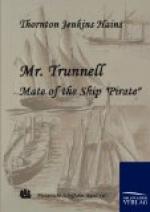The dog-watch is the short watch between six and eight o’clock in the evening. This is made short to keep one watch from turning to at any regular time and consequently getting all the disagreeable work to be done during those hours. For instance, if one watch had to be on deck every night from twelve until four in the morning, it would mean that the other watch would be on deck from four to eight, and consequently would have to do all the washing down of decks and other work which occurs upon every regulated ship before breakfast. So the dog-watch divides a four-hour watch and is served alternately. As second mate I had access to the poop and could come aft on the weather side like any officer, all sailors, of course, being made to go to leeward.
Trunnell grew to be confidential, and we often discoursed upon many subjects during the hours after supper; for there was little time to turn in when not on dog-watch, and the skipper allowed me aft with much more freedom than many second mates get. He seldom ventured to join in the conversations, except when discussing shore topics, for his ignorance of things nautical was becoming more and more apparent to me every day, and he saw it. I wondered vaguely how he ever managed to get command of the ship, and set the reason down to the fact that the agents were glad enough to get any one to take her out. He, however, checked up Trunnell’s sights every day and commented upon their accuracy with much freedom, finding fault often, and cautioning him to be more careful in the future. This somewhat perplexed the mate, as he always made his reckoning by rule of thumb, and could no more change his method than work out a problem in trigonometry. The third mate, on the other hand, was quite shy. I noticed what I had failed to note before, and that was the peculiar feminine tone of his voice and manner. He never swung his hands or lounged along the deck like a man used to the sea, and as the regulations call for at least two years’ sea experience certified to by some reputable skipper before a mate’s certificate is issued, this struck me as strange. Besides, he walked with a short mincing step that failed to swing his rather broad hips, and his knees were well set back at each stride, that went to show more conclusively than anything else that he was not used to a heaving deck. An old sailor, or a young one either, for that matter, will bend his knees to catch the roll and not try to walk like a soldier.
One evening after we had been out about a week, Trunnell and I happened to be standing aft near the taffrail looking up at a royal preventer stay.
“D’ye know what th’ old man called this cleat?” asked Trunnell, pointing to where it had been made fast.
“No,” said I. “What did he call it?”
“A timber noggin.”
“Well, that don’t prove there is anything wrong with him, does it?” I queried.
“Either that or the timber noggins has changed summat in character since I seen them last,” said Trunnell. “What in Davy Jones would a skipper of a ship call a cleat a timber noggin for unless he didn’t know no better?”




